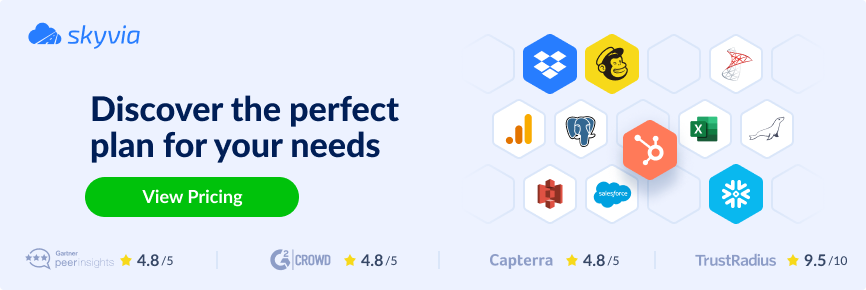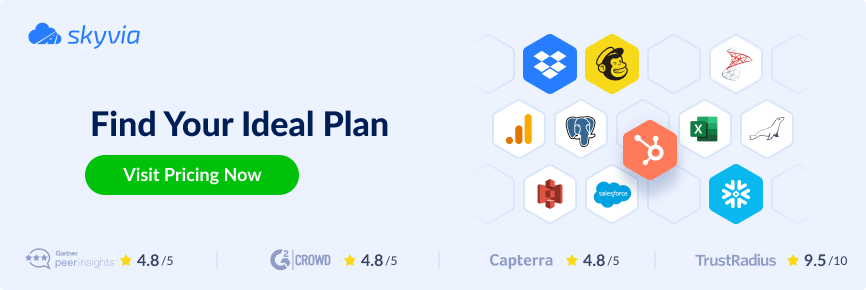In 2024, managing and protecting data is more critical than ever, and the right tools can make all the difference. Companies collect vast amounts of unstructured data year by year, and at last, they often cannot manage it correctly.
Imagine that just 3% of enterprises’ data meets quality standards and only 20% of companies successfully invested in data governance in 2022. In 2024, the situation is quite similar. It looks like such a small number in the data-driven world.
We’ve rounded up the top 10 data governance tools that set the standard this year. Whether you want to keep data secure, ensure compliance, or just make data work more effectively for you, these tools have covered.
Table of Contents
- What are Data Governance Tools?
- Main Features of Data Governance Tools
- 10 Best Data Governance Tools Comparison
- How to Choose the Most Suitable Data Governance Tools
- Final Thoughts
What are Data Governance Tools?
Imagine you’ve got a treasure chest full of valuable data. But you need some serious organization and security to keep that treasure in tip-top shape. That’s where data governance tools are essential for businesses looking to make the most of their data. They keep data in check, secure, and ready to provide valuable insights whenever needed.
Businesses use them for:
- Keeping data clean, accurate, and consistent.
- Enhancing security and compliance.
- Boost efficiency.
- Better decision-making abilities.
Here, we’ll find the solutions that brilliantly fit all popular criteria, but let’s go step by step.
Main Features of Data Governance Tools
There are a few core features essential for effective data governance, helping organizations manage, protect, modernize, and maximize the value of their data.
Let’s walk through each point and find the benefits.
| Feature | Benefit |
|---|---|
Data cataloging is like creating an organized library for a company’s data assets, including listing and describing data across the organization. | – Enhances data visibility and accessibility. – Supports efficient data management and usage. |
Data Lineage tracks the journey of data from its source to final destination. It visually maps out how data moves and transforms through various systems. | – Helps users understand the data lifecycle. – Is crucial for troubleshooting issues, conducting impact analysis, and ensuring data integrity. |
Data quality ensures data is accurate, consistent, and reliable, including data cleansing and validation. | – Maintains high data quality standards, reducing errors and enhancing the reliability of data-driven decisions. |
Data mastering creates a single, authoritative source of truth for key business entities. | – Ensures consistency and accuracy of critical data across the organization. – Supports better operational efficiency by providing a unified view of important data. |
Data security and privacy include encryption, access controls, and compliance with privacy regulations. | – Helps maintain regulatory compliance. – Protects against data breaches and builds trust with customers and stakeholders. |
10 Best Data Governance Tools Comparison
Skyvia
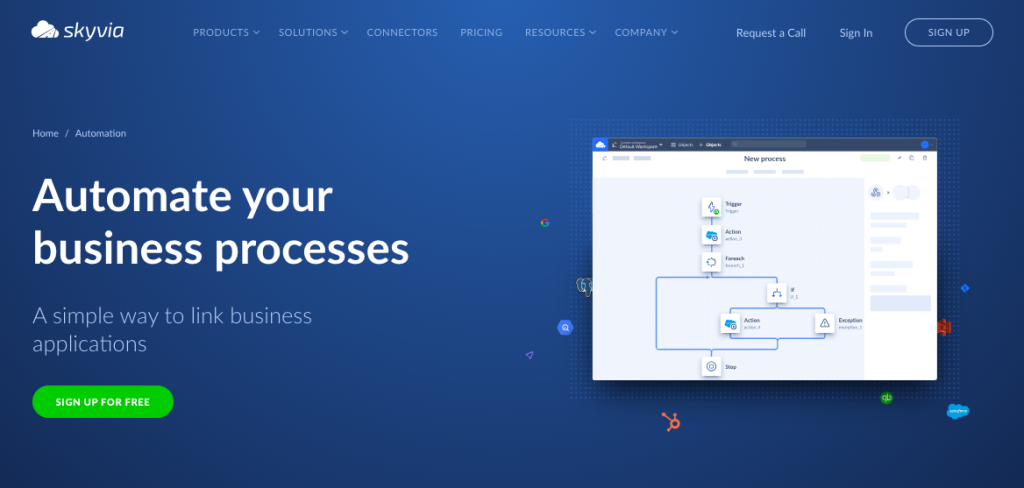
If you’re looking for a versatile and user-friendly cloud-based data platform, Skyvia is the way to go. It’s not just about data integration; Skyvia excels in data backup and governance, making it a one-stop solution for all companies’ data needs. Skyvia helps keep data organized, secure, and easily accessible, not depending on the business size.
Key Features
- Data integration, ETL, ELT, and reverse ETL.
- Data backup and restore.
- Data synchronization.
- Workflow automation.
- No-code, drag-and-drop interface.
Pros
- User-friendly and easy to set up.
- Robust data security features.
- Excellent for integrating 180+ data sources.
Cons
- Limited advanced customization options.
Pricing
- Paid plans are highly flexible and start at $7/month.
- Free plan is available.
Informatica Axon
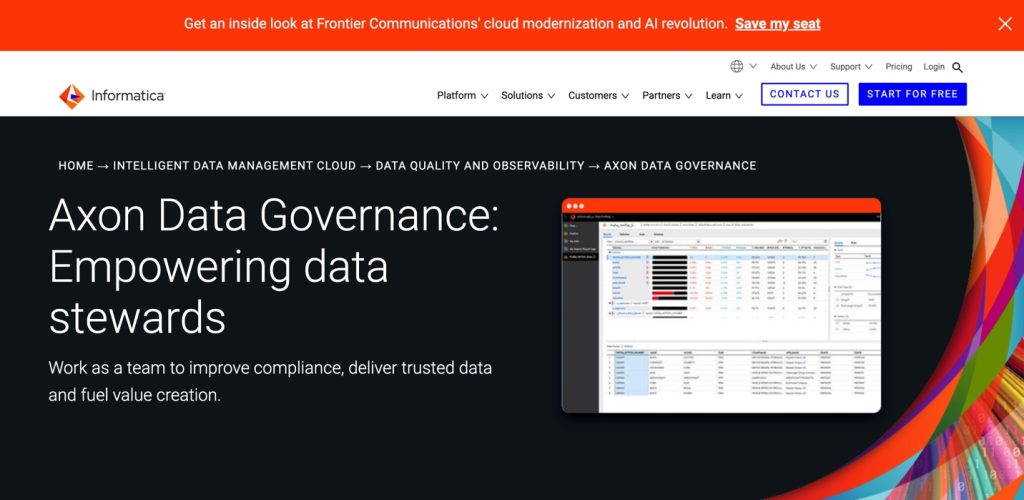
Informatica Axon is designed for enterprise-level data governance and provides comprehensive features that ensure data is managed, compliant, and of the highest quality. It’s helpful if you’re dealing with complex data environments and need a reliable solution.
Key Features
- Data cataloging and lineage.
- Regulatory compliance.
- Integration with Informatica’s broader data suite.
Pros
- Robust data governance capabilities.
- Excellent collaboration features.
- Strong integration with other Informatica tools.
Cons
- High cost, suited for larger enterprises.
- Steeper learning curve.
Pricing
- Custom pricing based on organizational needs.
Collibra
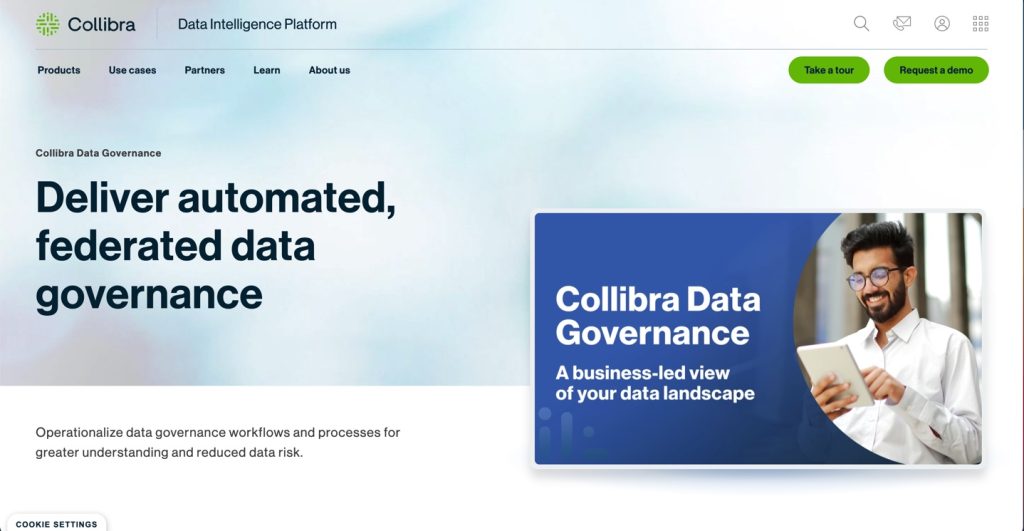
Collibra is about collaboration and making data governance accessible and effective. With a focus on user-friendliness, Collibra helps businesses efficiently manage their data assets. It’s perfect for involving a data-driven culture where everyone in the organization can access and trust the data they need to make informed decisions.
Key Features
- Data quality management.
- Policy management.
- Strong collaboration tools.
Pros
- Easy to use and set up.
- Excellent for fostering a data-driven culture.
Cons
- It can be pricey for smaller businesses.
- Some features may require additional customization.
Pricing
- Custom pricing based on business requirements.
Alation
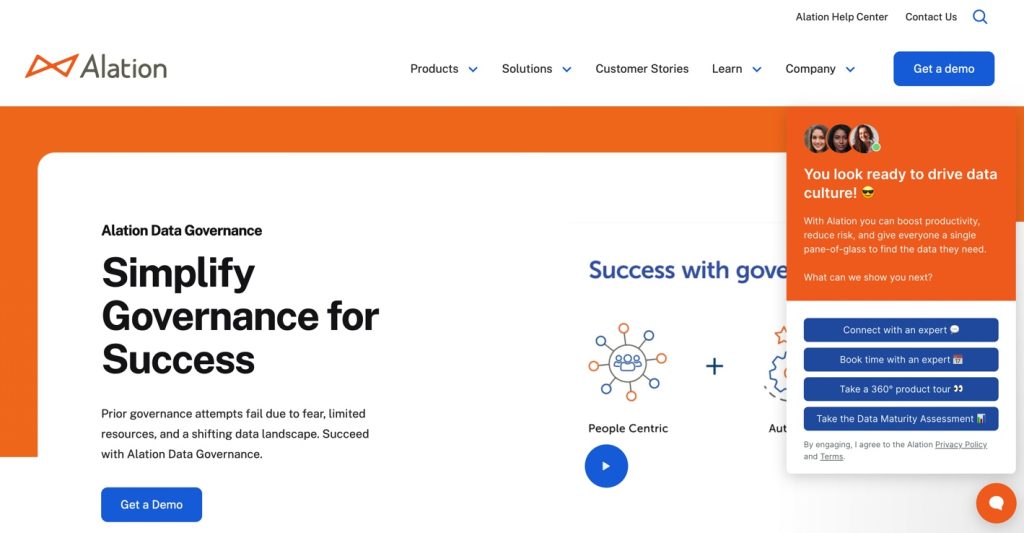
Alation stands out for its focus on data stewardship and collaboration. This tool is designed to help organizations enhance their data governance by making it easy for users to discover, understand, and trust their data.
Key Features
- Data catalog.
- Collaboration tools.
- Machine learning for data insights.
- Integration with various data sources.
Pros
- Great for fostering collaboration.
- User-friendly and intuitive.
- Strong data stewardship features.
Cons
- It can be expensive for small businesses.
- Some advanced features may require technical expertise.
Pricing
- Custom pricing based on organizational needs.
IBM InfoSphere Information Governance Catalog
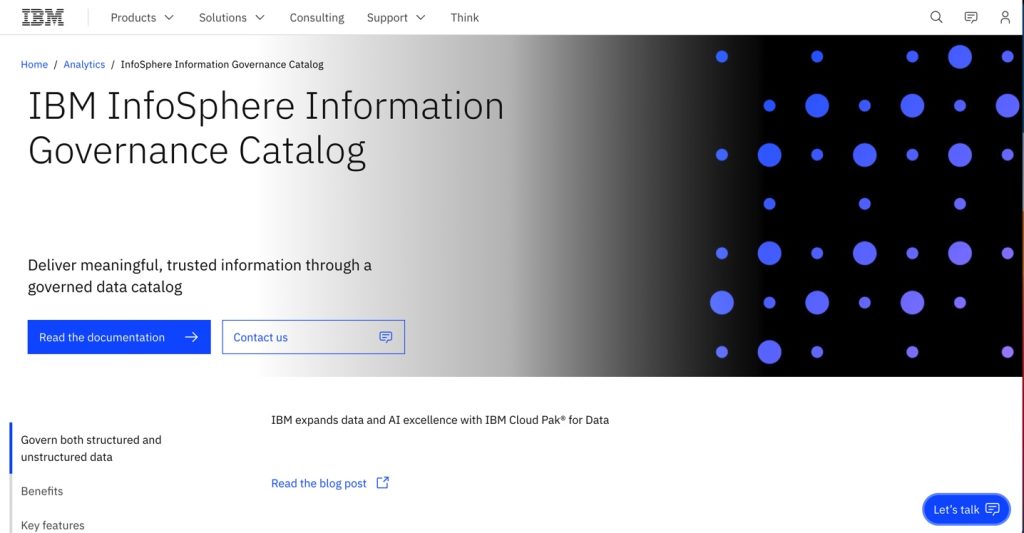
IBM InfoSphere Information Governance Catalog is part of IBM’s robust suite of data management tools designed to help large enterprises manage their data assets effectively, ensuring compliance, quality, and security. If you already use IBM’s ecosystem, this tool integrates seamlessly to provide a comprehensive data governance solution.
Key Features
- Compliance and policy management.
- Integration with IBM’s data suite.
- Metadata management.
Pros
- Strong integration with IBM tools.
- Comprehensive data governance features.
- Excellent support and professional services.
Cons
- High cost, suitable for larger organizations.
- Complex setup and management.
Pricing
- Custom pricing based on enterprise needs.
Talend Data Fabric
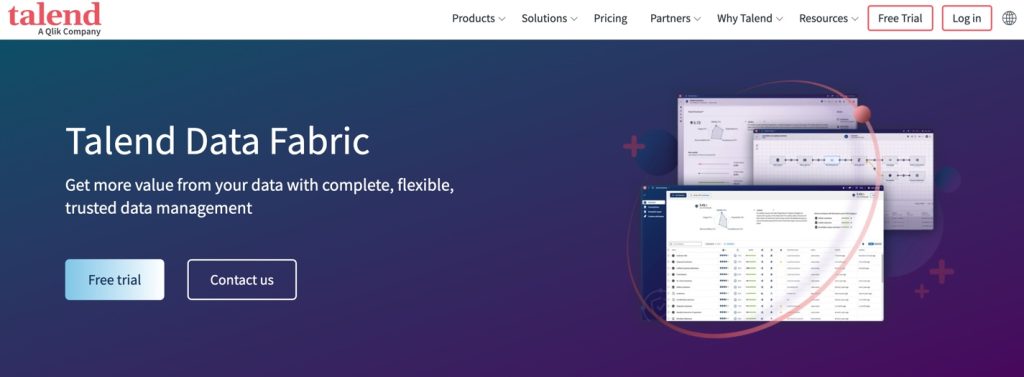
Talend Data Fabric is a comprehensive platform that combines data integration, quality, and governance. It’s perfect for businesses looking to manage their data holistically, ensuring it’s clean, compliant, and ready for use. Talend offers a scalable and flexible solution that grows with your data needs.
Key Features
- Data integration and ETL.
- Data governance and stewardship.
- Real-time data processing.
- Cloud and on-premises deployment.
Pros
- The platform is scalable and flexible.
- Strong community support.
Cons
- It can be resource-intensive.
- The steeper learning curve for new users.
Pricing
- Custom pricing based on business needs.
Ataccama ONE
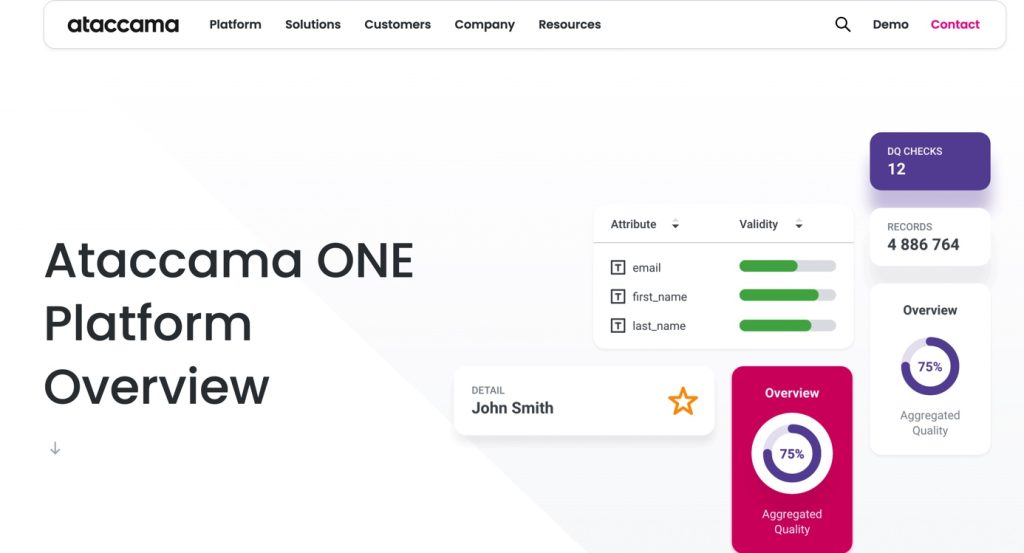
Ataccama ONE is a unified data management platform that offers robust data governance and quality features. The platform automates and streamlines data management processes, making it easier for businesses to maintain high data standards.
Key Features
- Data quality management.
- Data governance and cataloging.
- Master data management.
- AI-powered data insights.
- Scalable architecture.
Pros
- Strong data quality features.
- User-friendly interface.
Cons
- Customization can be complex.
- Higher cost for advanced features.
Pricing
- Custom pricing based on the features selected.
SAP Master Data Governance
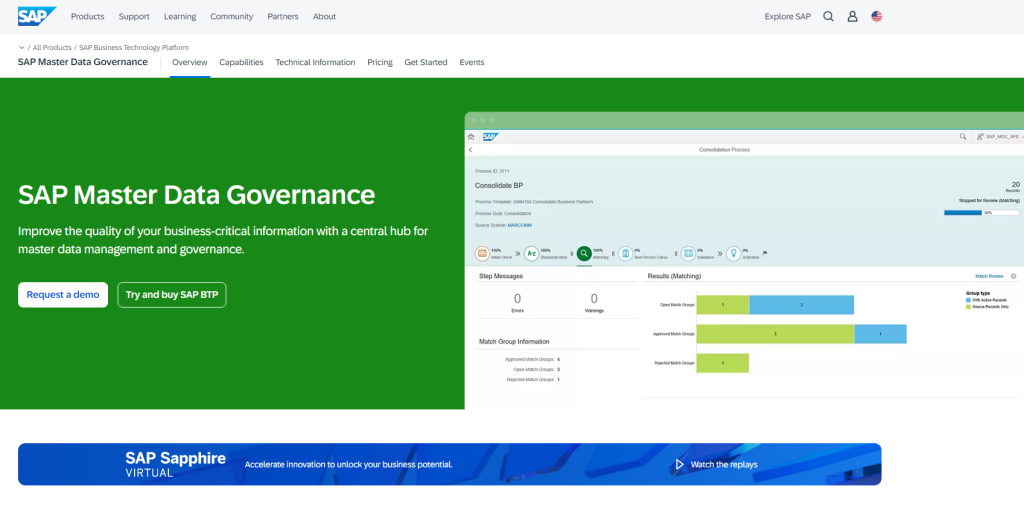
SAP Master Data Governance is a top choice for businesses already in the SAP ecosystem. It provides robust tools for managing master data, ensuring data quality, and maintaining compliance.
Key Features
- Master data management.
- Workflow and process management.
- Strong data quality and governance features.
- Real-time data processing.
Pros
- Seamless integration with SAP applications.
- Scalable and flexible.
Cons
- High cost, suited for larger enterprises.
- The steeper learning curve for non-SAP users.
Pricing
- The pricing is custom and depends on the business requirements.
Microsoft Purview
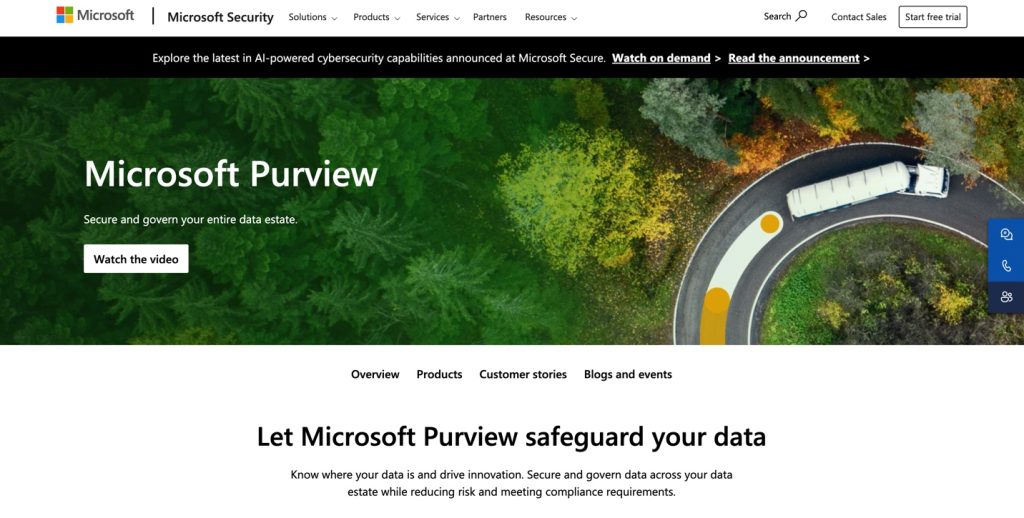
Microsoft Purview offers comprehensive data governance, cataloging, and compliance solutions. It helps businesses manage their data assets effectively while ensuring regulatory compliance. Microsoft Purview integrates seamlessly with Azure services to provide a holistic data governance solution.
Key Features
- Data catalog and lineage.
- Data classification and discovery features.
- Compliance and policy management.
Pros
- Seamless integration with Azure.
- Scalable and user-friendly.
Cons
- Best suited for businesses using Microsoft services.
- Some advanced features require additional configuration.
Pricing
- Custom pricing based on organizational needs.
Erwin Data Intelligence
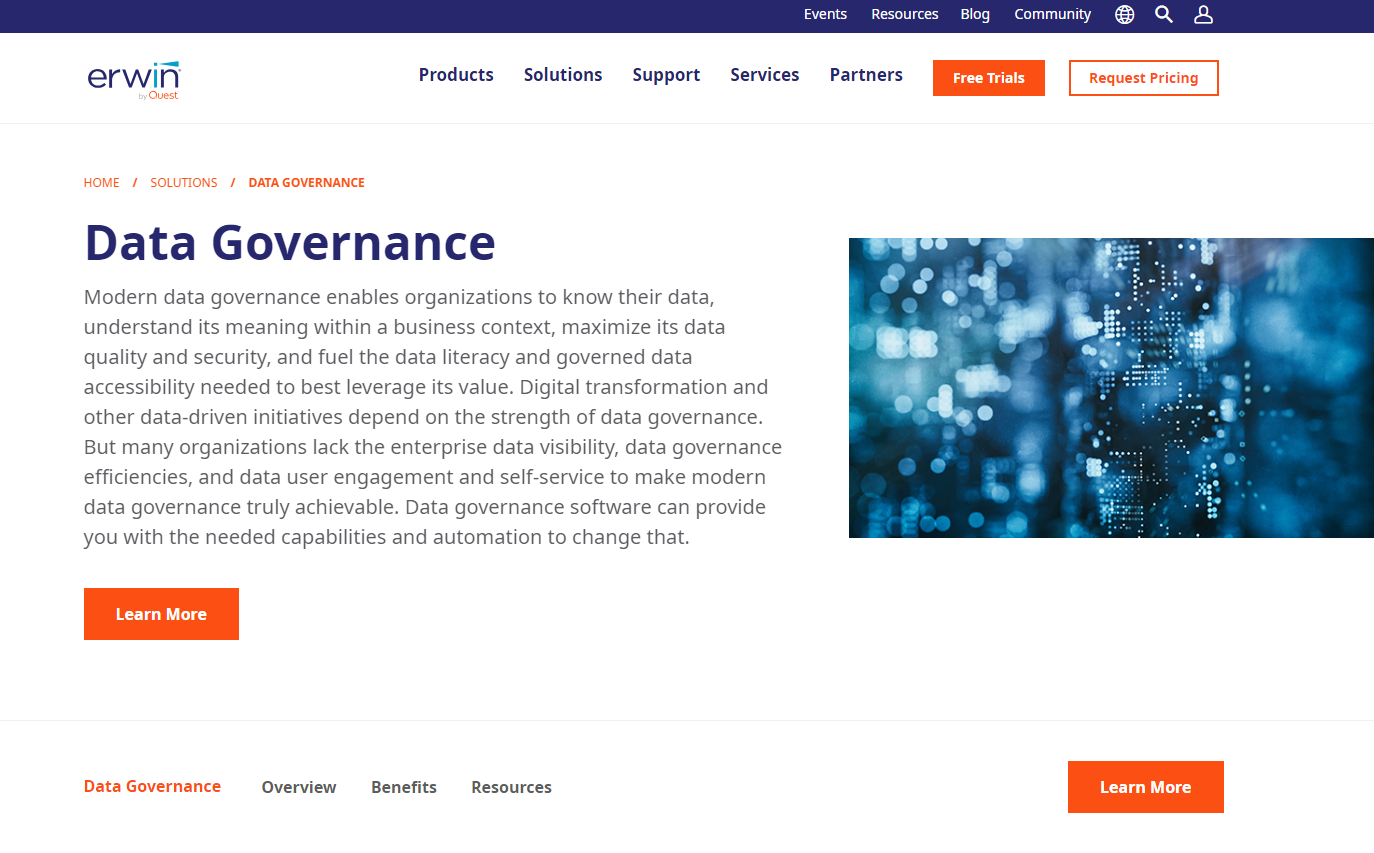
Erwin Data Intelligence is about data governance and intelligence. It focuses on providing detailed data lineage, quality management, and compliance capabilities. This tool is ideal for businesses needing in-depth insights into their data environments and ensuring data is trustworthy and compliant.
Key Features
- Data lineage and impact analysis.
- Data quality management.
- Metadata management.
- Compliance and policy management.
- Integration with various data sources.
Pros
- Comprehensive governance features
- Excellent for compliance and regulatory requirements.
Cons
- Higher cost for advanced features.
- The tool can be complex to set up.
Pricing
- The pricing is flexible depending on your business needs.
How to Choose the Most Suitable Data Governance Tools
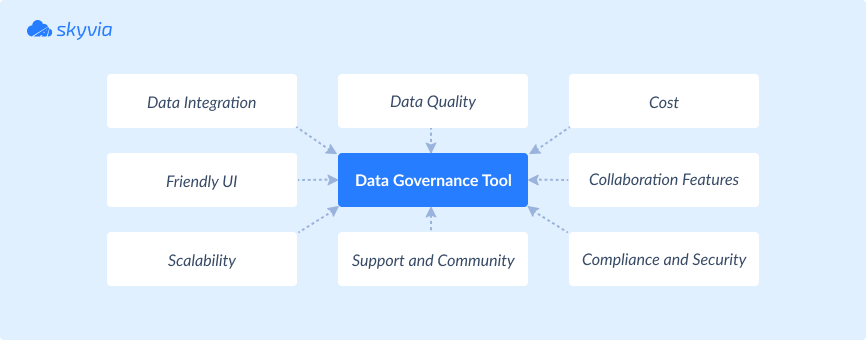
Choosing the perfect tool for business needs has often been a bit troublesome, and data governance isn’t some exclusion. This table summarizes how to choose the most suitable tool, including the essential features.
| Criteria | Why It Matters | Tip |
|---|---|---|
Data Integration | Ensures smooth data flow and consistency across the organization. | Check if the tool supports databases, cloud services, and any other data sources you use. |
User-Friendly Interface | Promotes quicker adoption by the team. | Check current users’ reviews on G2 Crowd, TrustRadius, etc. Take advantage of free trials or demos. |
Scalability | Handles larger data volumes and more complex data governance needs as your business grows. | Look for tools that offer scalable solutions, whether you’re a small startup or a large enterprise. |
Data Quality Management | Maintains good data quality, which is essential for effective data governance. | Look for features like automated data quality checks and detailed reporting. |
Compliance and Security | Helps stay compliant with regulations (HIPAA, GDPR, PCI DSS, ISO 27001 and SOC 2 (by Azure, etc.). and protects data. | Check for compliance certifications and features like encryption, access controls, and audit logs. |
Collaboration Features | Facilitates teamwork in data governance efforts. | Look for solutions that facilitate collaboration through shared workspaces, task management, and communication tools. |
Cost | Ensures the tool is cost-effective and stays within budget. | Compare pricing plans and consider the total cost of ownership, including any hidden fees or long-term contracts. |
| Support and Community | Provides assistance and resources, especially when starting out. | Look for tools with active user forums, comprehensive documentation, video tutorials, and responsive support teams. |
Final Thoughts
Even in the same industry, different businesses have their own unique needs. Trying a set of services that meet the criteria selected to find the best one is a working idea. It’s like tasting the ice creams in gelaterias to choose the most tasty one. The perfect data governance tool has to balance a rich set of features, integration capabilities, data quality, security, and compliance for an appropriate price.
According to these criteria, Skyvia is a good choice. You can start Skyvia’s free trial now to try its key capabilities.
